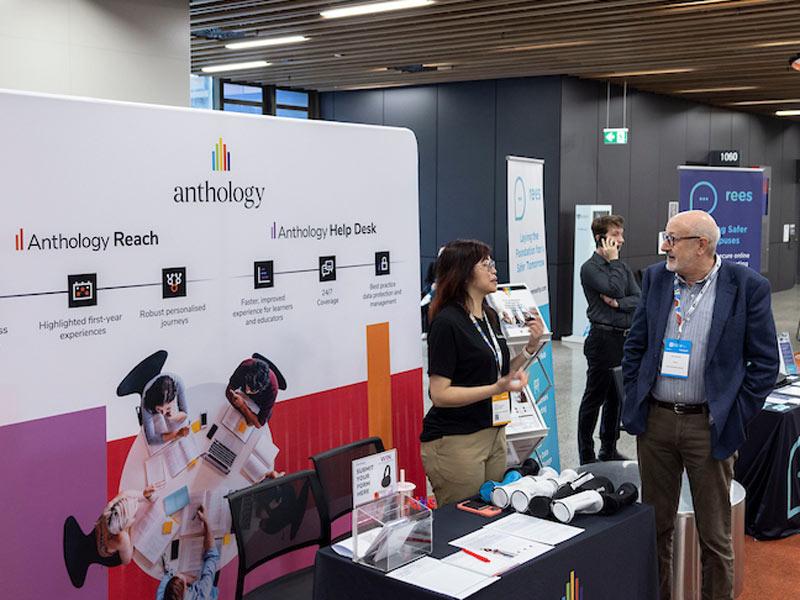Microcredentials are reshaping student journeys and unlocking new revenue streams for higher education institutions. During a round-table discussion at the 2023 THE World Academic Summit, held in partnership with Anthology, stakeholders from the academic sector came together to discuss the benefits and challenges associated with microcredentials.
“Microcredentials are so much more complex than everyone initially thought they were,” said Caroline Steel, principal strategic consultant at Anthology. “They are also incredibly disruptive of university business and operations." Steel outlined the important factors institutions should consider when implementing microcredentials, including investment strategy, industry needs, quality assurance and student experience.
“One of the challenges surrounding microcredentials concerns monetisation,” said Lisa Cary, dean of learning and teaching innovation at Charles Sturt University in Australia. “It’s not simply a case of slicing existing courses into smaller chunks.”
Microcredentials created through industry partnerships could ensure that university courses are fit to bridge the skills gap plaguing economies across the globe. “For some time, industry has been lacking in terms of engagement with academia,” explained Steven Worrall, regional managing director at Microsoft Australia and New Zealand. “Today, with the size of many skills gaps, industry is realising that it must act as a joint partner with universities in the creation of microcredentials.”
“I sometimes wonder if we ask the question from an outdated point of view,” said Alwyn Louw, vice-chancellor of Torrens University in Australia. “In 20 years’ time, universities are likely to be substantially different from how they are today. There is likely to be a new culture and a new perspective in the higher education space – and microcredentials will establish new partnerships with industry.”
“It’s also important not to neglect the learner’s perspective in discussions around microcredentials,” said Yatimah Alias, deputy vice-chancellor for academic and international at the University of Malaya in Malaysia. “Signing up for a traditional three-year course is a big commitment in an age where skills need to be rapidly refreshed in the job market.”
The idea that individuals should have completed their learning experience before entering the workplace is no longer fit for the modern world of work. “Universities have to prepare students for new economic realities,” acknowledged Carolyn Evans, president and vice-chancellor of Griffith University in Australia. “Co-creation of microcredentials is key here – something we’ve pursued through our curricula on detecting financial fraud, which has been curated by stakeholders from banking as well as academics from our criminology and IT departments.”
Data analytics can be extremely helpful in helping institutions better understand the design of their microcredentials. “Analytics can help us to assess the effectiveness of our microcredentials,” said Tanya Lawlis, associate dean of education and strategy at the University of Canberra in Australia. “But we do have to be wary of any assumptions of causation.”
The panel agreed that the needs of the learner should be considered carefully when microcredentials are offered. “This all comes back to what value learners see coming from the microcredential and how it fits into their life,” said Kate May, director of alumni and supporter relations at the University of Sydney in Australia.
Much of the value that sits within a degree continues to be closely associated with a university’s brand. Microcredentials could disrupt this by shifting value towards what you know rather than the institution you attend. “There is a big difference between the B2B and B2C worlds when it comes to microcredentials,” said Pascale Quester, president and vice-chancellor of Swinburne University of Technology in Australia. “This affects whether an employer is likely to be supportive of your microcredentials or not.”
“For me, this is about pedagogy,” said Robyn Ward, executive dean and pro vice-chancellor of the University of Sydney in Australia. “I think academics often think they already have the best pedagogy, but there is a paradigm shift required to deliver high-quality microcredentials.”
It’s important to think about student experience from the very first touchpoint to graduation and beyond. Julie Cooke, head of the School of Rehabilitation and Exercise Science at the University of Canberra in Australia, said there are important questions to ask when offering microcredentials: “How do students discover that your institution offers microcredentials? How can you make them compelling? And what comes after?”
Implementing microcredentials does come with an administrative burden, but the benefits for a broad spectrum of learners are undeniable. “Universities are being asked by students to offer new, innovative ways of learning,” said Jane Hanrahan, chief of the academic board at the University of Sydney in Australia. “Convince me. Teach me. Support me. These are the things students continue to demand – whether they are studying for a traditional degree or microcredentials.”
The panel:
- Yatimah Alias, deputy vice-chancellor for academic and international, University of Malaya
- Zac Ashkanasy, principal, Nous Group
- Lisa Cary, dean of teaching and learning innovation, Charles Sturt University
- Julie Cooke, head, School of Rehabilitation and Exercise Sciences, University of Canberra
- Carolyn Evans, president and vice-chancellor, Griffith University
- John Gill, editor, Times Higher Education (chair)
- Jane Hanrahan, chief of the academic board, University of Sydney
- Tanya Lawlis, associate dean of education and strategy, University of Canberra
- Alwyn Louw, vice-chancellor, Torrens University
- Kate May, director of alumni and supporter relations, University of Sydney
- Pascale Quester, president and vice-chancellor, Swinburne University of Technology
- Caroline Steel, principal strategic consultant, Anthology
- Robyn Ward, executive dean and pro vice-chancellor, University of Sydney
- Steven Worrall, regional managing director, Microsoft Australia and New Zealand
Find out more about Anthology.


comment